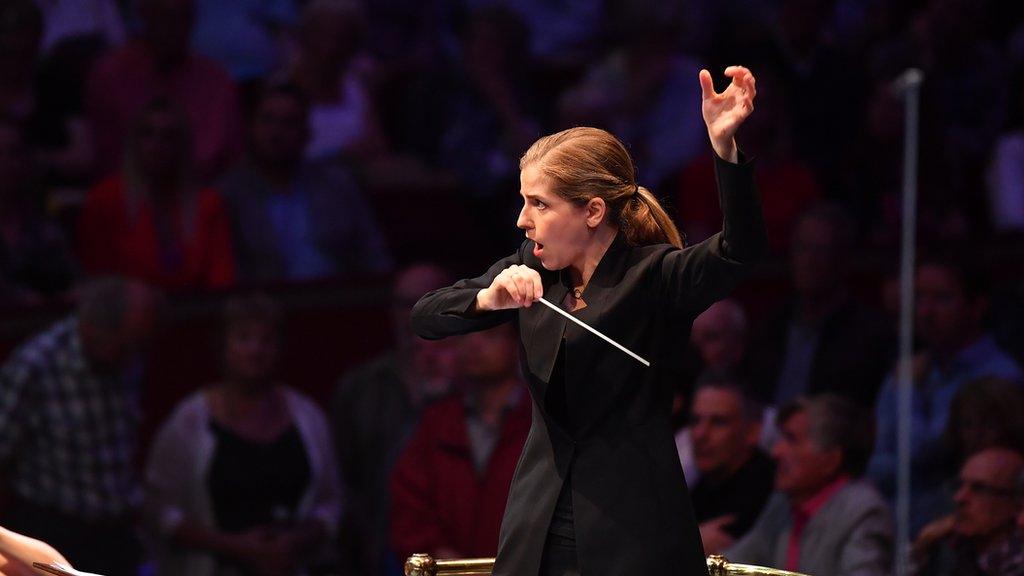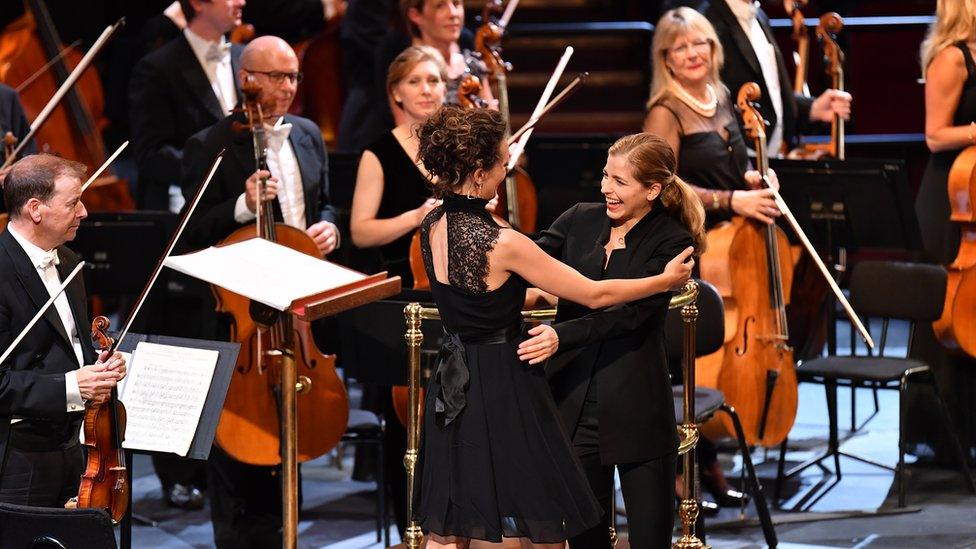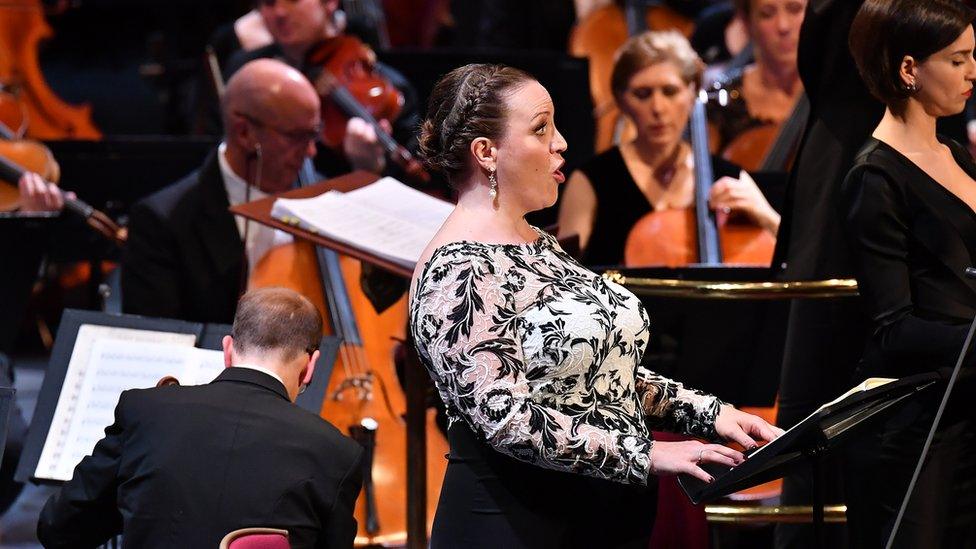Conductor Karina Canellakis makes Proms history with stirring First Night
- Published

Karina Canellakis took up the baton after being encouraged by Sir Simon Rattle
Karina Canellakis has made history, as the first woman to conduct the First Night of the BBC Proms.
The US musician led the BBC Symphony Orchestra and Chorus and BBC Singers in a stirring and dramatic programme culminating in Leoš Janáček's utterly unique Glagolitic Mass.
The landmark performance came just two years after Cannellakis's conducting debut at the Proms.
"I'm honoured - and I'm very sweaty," she said after leaving stage.
The 38-year-old New Yorker started her career as a violinist after graduating from the Julliard School.
The seeds of her conducting career were sown at the BBC Proms in 2008, as she performed Mahler's emotional 6th Symphony as part of the Chicago Symphony Orchestra.
"I was playing second violin, and I played my heart out," she told BBC Radio 3, "and I remember just looking up and thinking I had never seen the ceiling so far away."
But it was British conductor Sir Simon Rattle who finally convinced her to swap the violin for the baton.
"He told me: 'You may not see many people that look like you up there, but I really think you could do this,'" she told the bachtrack website earlier this year, external.
"That was the thing that changed my pattern of thinking and gave me a little bit of a push towards... making music without the instrument in my hand, which in the beginning was quite terrifying."
On Friday night's evidence, she has ably grown into the role.
Her opening night kicked off with a complex, layered new work by Canadian composer Zosha Di Castri.
Long Is the Journey - Short Is the Memory was commissioned to mark the 50th anniversary of the Apollo 11 Moon landing, and explored everything from the dark, brooding exploration of space to man's first weightless steps on the lunar surface.

Karina Canellakis embraces composer Zosha Di Castri after premiering her new work
Di Castri managed to convey the eerie loneliness of that first moonwalk in a section where the orchestra rubbed together paper bags, blew compressed air into milk bottles, and scraped tuning keys across harp strings, while a lone oboe represented the awestruck wonder of astronauts Buzz Aldrin and Neil Armstrong.
The chorus, meanwhile, sang an evocative text by Chinese-British author Xiaolu Guo: "We stepped out and bounced, skipped, swang wide, set the flag on the silent lunar surface."
Researching the piece left a major impression on the composer, who had never before considered the monumental human effort behind the Moon landings.
"To be honest, it was something that I took as fact - that we've been to the Moon," she said. "This brought back the sense of awe."
The first half concluded with a lovingly-shaped rendition of Dvořák's The Golden Spinning Wheel, receiving its first-ever performance at the Proms.

Zocha Di Castri's piece is the first of many Proms to mark the 50th anniversary of the lunar landings
Part two was devoted to Janáček's elemental Glagolitic Mass - one of the greatest 20th Century choral works.
A setting of a ninth-century liturgical text, it is essentially the atheist composer's hymn to nature.
"Always the scent of the moist forest - that was the incense," said the Czech musician. "I felt a cathedral grow before me in the vast expanse of the hills and the vault of the sky".
"It is as much pagan ritual as it is a mass," acknowledged Canellakis ahead of the concert, "and it switches drastically from one section to another."
Under her watch, the BBC Symphony Orchestra expertly navigated the shifting celestial and confrontational tones, while organist Peter Holder deservedly received an ovation after untangling the labyrinthine solo.

Mezzo-Soprano Jennifer Johnston described the Glagolitic Mass as having a "filmic quality"
Soloists including tenor Ladislav Elgr and mezzo-soprano Jennifer Johnston were crisp and clear - despite being unclear on how the text should sound.
"Glagolitic was the precedent to the Cyrillic alphabet [and] the result is we don't really know how it's meant to be pronounced," she explained to BBC Radio 3.
"It's our best guess, along with academics who've given us some guidance."
The piece also highlighted a theme of the 2019 Proms season, which is marking the 150th anniversary of the birth of Sir Henry Wood. The Proms founder-conductor presided over the premiere of the Glagolitic Mass at the Queen's Hall in 1930.
The modern-day Proms, of course, are based in the Royal Albert Hall - where more than 1,000 of Friday's concert-goers were "Prommers", who had queued all day in the rain to snap up "on the day" tickets for just £6.
For Canellakis, it is those concert-goers who give the festival its unique flavour.
"I love the enthusiasm of the audience here," she said. "It's not an eight-year-old whose grandma drags him to the opera and he falls asleep in the back row.
"These people have waited for hours to get tickets and many of them are standing through the whole performance - and you feel that, as a performer."
The conductor, who has played the Proms every year since taking up the baton, is guaranteed to be back - and could conceivably follow in the footsteps of Marin Alsop, who in 2013 became the first woman to helm the festival's iconic closing night.
The 2019 season continues until 14 September, with highlights including a sci-fi Prom, the premiere of a new work by Radiohead's Johnny Greenwood, and performances from cellist Sheku Kanneh-Mason and "the Queen of African music" Angelique Kidjo.

Follow us on Facebook, external, on Twitter @BBCNewsEnts, external, or on Instagram at bbcnewsents, external. If you have a story suggestion email entertainment.news@bbc.co.uk, external.
- Published19 July 2019

- Published17 April 2019

- Published12 May 2019
